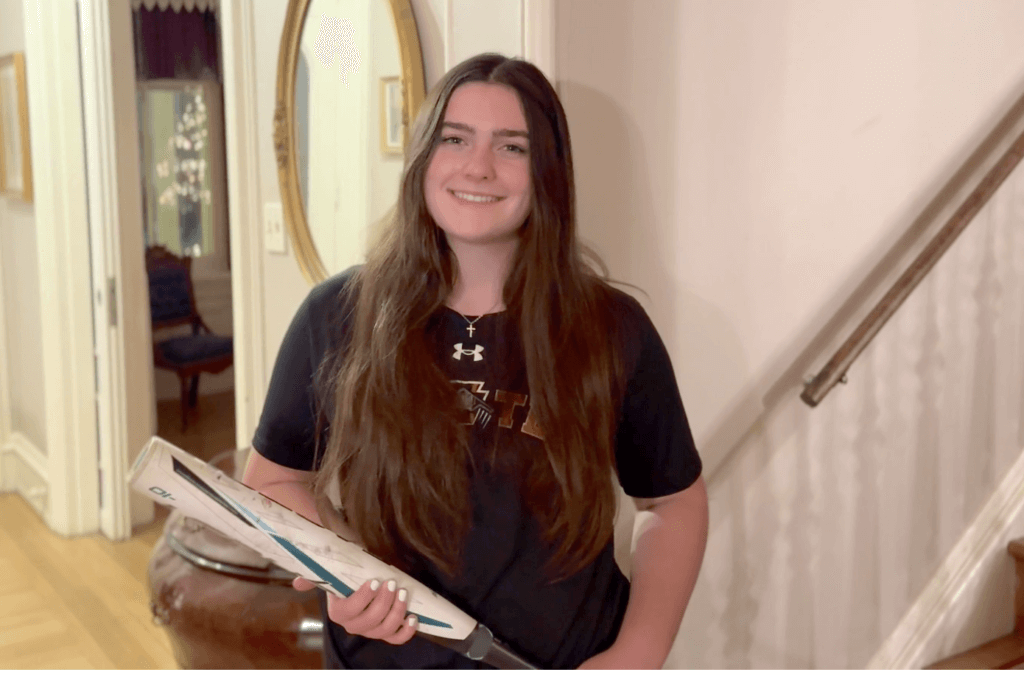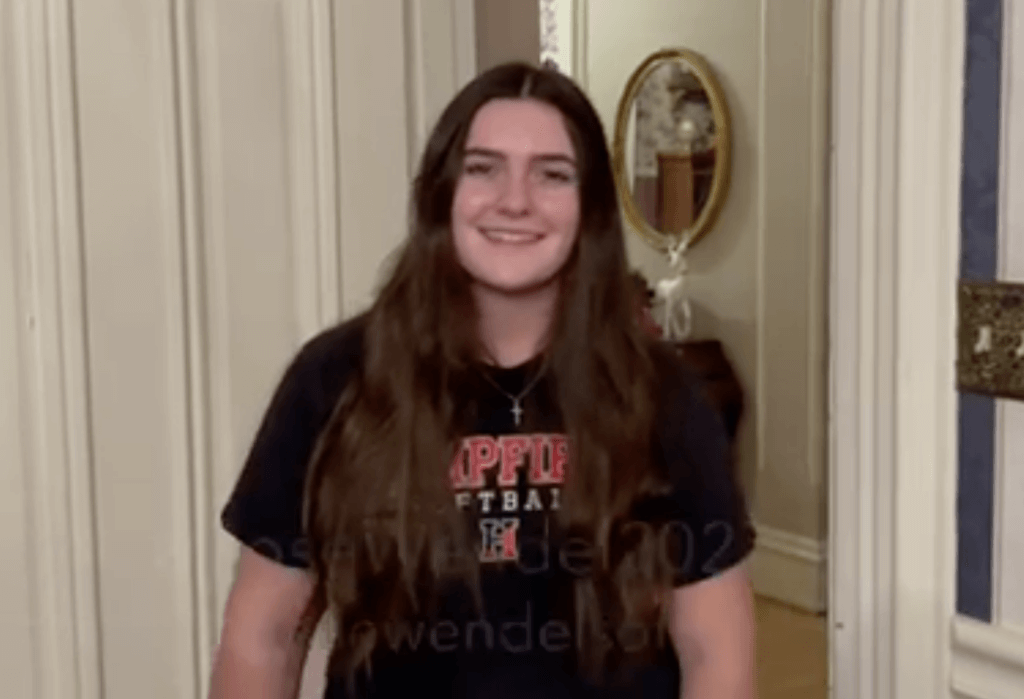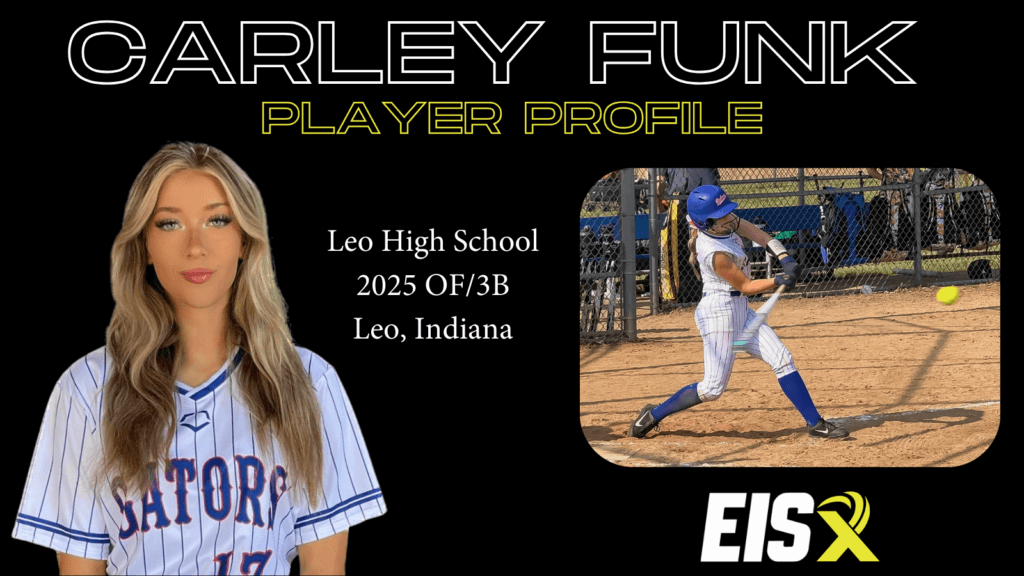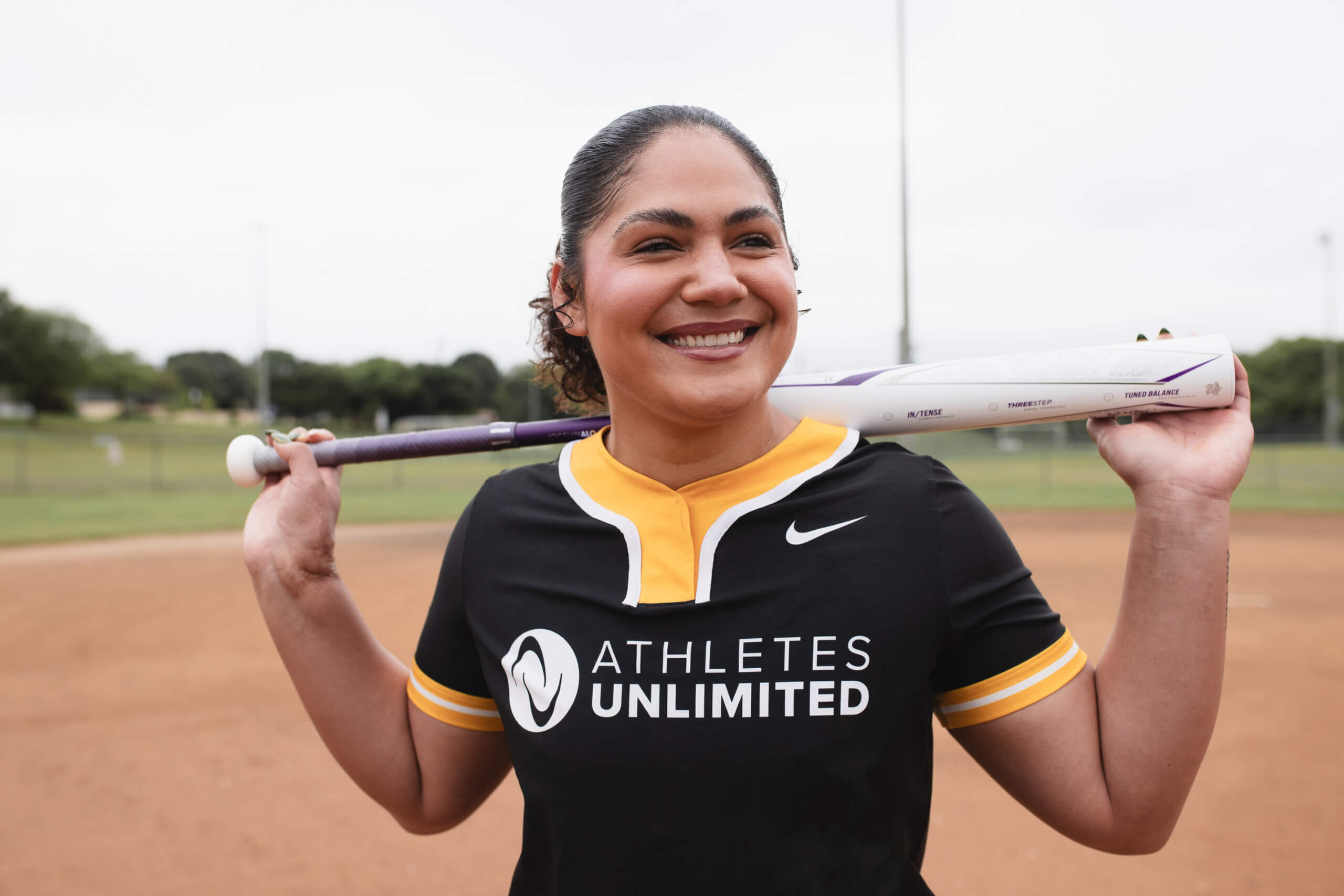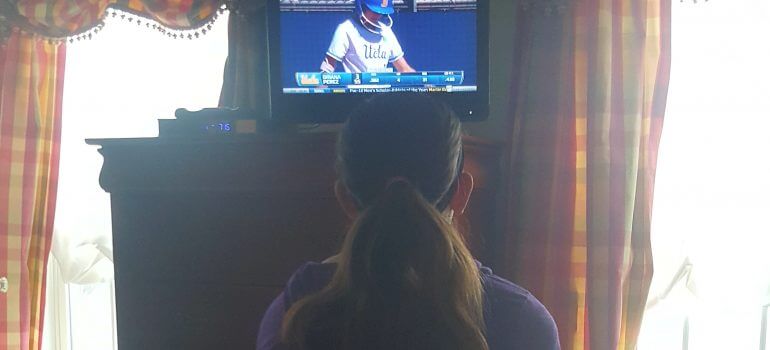
In our coverage leading up to and after the new Early Recruiting legislation that went into effect on Wednesday, April 25th, we presented a lot of different viewpoints for and against what was ultimately approved by the NCAA including college and club coaches, committed players and parents going through the experience.
However, one voice we haven’t presented—until now—is a young, promising fastpitch player who is in the middle of the recruiting process and how SHE sees these rules as impacting her future.

Cassadie “Sadie” Armstrong is a 5-foot-10 pitcher/infielder who plays for the Central Mass Voodoo 14U team and is a 7th grader (Class of 2023) from Portland, Maine.
In her latest blog for Extra Inning Softball, she very eloquently covers three areas changing with the new rules and very eloquently surmises how she thinks this will play out with her and her peers on the same path.
An accomplished fastpitch player already, Sadie’s honors already have included being named a 2017 All American by USA Softball 12U, a member of USSSA Elite Select Futures and chosen as a Pre-Season Rookie by Under Armour Softball Factory thanks to a 62 mph screwball and a 61 mph dropball with consistent ball exit velocity speeds in the high 60s to low 70s.
In 2016, Sadie was named the Maine State Champion Pitcher for both Little League and USA Softball. She plays basketball for the 2017 AAU State Champion Firecrackers and off the field was her school’s French Student of the Year and is an honors violinist.
*****
I had this birthday slumber party a few years ago and I knew that a close friend would be unable to attend because she had summer sleep-away camp for two weeks.
My mother made me write out an invitation to her, anyway. It seemed dumb to me at the time. After all, I already knew she was unavailable.
Begrudgingly, I dotted the careful cursive script on her envelope with a heart sticker, knowing that my friend would not even see the pretty, lavender envelope until she got back from camp well after the party had taken place.
In response to my protests, my mom explained that even if someone is not going to be able to make it to the party, at least they knew they were included and that it is better to give someone the option to say “no thank you” than to make the decision for them by not extending the offer in the first place.
Early recruiting in softball kind of feels like trying to score an invitation to the party thrown by the cool kids. Everyone wants to be part of the “in crowd” and feel valued. It is always nice to be asked even if the offer is not one you take, especially when your friends (and teammates) are being asked.
Softball recruiting by college coaches is a topic that I have been thinking about for a few years. I am 12-years-old. That means that when I was nine years old, I was trying to chart a path to get recruited by schools that I would not attend for almost as many years as I had been alive.
Some days, I am aggravated by all of the effort to create a path for myself. Other days, I find it exhilarating and interesting. Recruiting is just a part of my softball journey as I knew what my end game was from an early age.
My friends who play other sports, including lacrosse, usually have no idea what I am talking about if I use acronyms like “PSA”(Prospective Student-Athlete) and anyone outside of my softball bubble who overhears conversations thinks I am nuts to be discussing recruiting at my age.
Yet, within my softball bubble, consisting of kids who will all likely play at a high level in college and their families and coaches, we have recruiting on our minds.
It seems that a lot of people are quick to complain about these young kids “verballing” and don’t take into account that they are talking about the .001% of players.
These girls are exceptional and would get top offers regardless of when it occurred. The colleges are competing with each other to get these players while most other kids are competing with each other to get the college offers.
Really, though, as future college players, making big decisions, we need to know:
How many of the kids who have verballed early actually:
- played softball in college;
- competed for the school they verbally committed to;
- had the same terms honored that were originally offered.
With changes to the NCAA recruiting rules occurring even as I write this article, I decided to analyze some of the changes that would happen and assess how three of those changes would affect me as I seek to eventually be recruited in this new, more regulated era.

Among my peers, we find there are a few aspects of the rule changes that are particularly difficult for us to overcome in our efforts to be recruited. We live in an area of the country where it is difficult (to say the least) to be seen, let alone noticed, by the top college softball programs.
As a result, we have to travel to the Southeast and out West in order to hopefully get on someone’s radar by playing well against the top competition. The challenging circumstance of living in a climate where there is not a lot of local softball recruiting means that these specific changes to the rules affect my local teammates and me in very specific ways:
-
College coaches cannot have recruiting conversations about PSA’s (defined by the rule as seventh graders instead of ninth graders, now) because third party conversations about recruiting are prohibited.
At first glance, this rule feels like it will impose a heavy burden on players who are not local to the colleges because we rely on the advocacy of coaches and word of mouth from our guest appearances and from the teams with which we roster in order to play high profile tournaments.
However, the fact that direct conversations with PSA’s are also prohibited makes it feel like our opportunities are a bit more even, as coaches cannot talk directly with PSA’s whom they know or at least recognize about recruiting.
The good thing about this rule, is that there was a clarification made that coaches can have evaluative conversations with coaches about PSA’s so long as recruiting is not part of that conversation.
For example, the coach can inquire as to whether you throw a decent rise ball but not tell you that she/he will save a spot on the roster for you if you do (as I understand it). Maybe this rule levels the playing field for kids across the country, because no matter who you are and where you are from, you need to have school and club coaches who are really proactive about selling you.
Many early recruits have noted that they are inspired to fulfill their side of the bargain with their future coach, by having an early verbal offer. They know that they have a reward waiting for them if they perform and that is a great motivator. I will personally find my motivation by seeing my practice pay off when I play in game situations. Hopefully those offers will just come later.
Okay, so the practical effect is that I cannot commit but a coach can find out if I am a decent human being, I can still send out notes to introduce myself along with my report card and a skills video, as well as my schedule, and my club and school coaches can speak on my behalf without feeling that they are playing the telephone game and not acting as a go-between.
More importantly, I maintain the opportunity to get on someone’s radar and earn staying there.
-
College coaches can give tours and assess my skills at a camp but cannot engage in recruiting discussions.
Here’s an important one for me, personally and it is likely important for most players and college coaches, too. I am really excited to attend camps for some of my favorite schools and to establish a relationship with coaches and players whom I admire.
I enjoy learning from different sources and I also want to get to know coaches and their coaching style before making important decisions. Likewise, coaches hopefully would want to know my personality and whether I respond to their coaching before, or as a part of, looking at me as a prospect. I specifically look for coaches who create a positive team culture.

I am so happy that the attendance at camp, which I imagine is also a major money-maker for the programs, is not limited by the new rules. I think that attendance at camp is very important under the rule change because this is the only chance coaches can get to know you, personally, and to see if you are coachable.
As a result, I anticipate that camp enrollment will increase a lot even if offers are not presented at or following camps. The nice thing about attending a camp earlier rather than later is that a coach can assess your projections for size, speed, strength and other measurable variables over a few years and see that you have a northeast rise as your trajectory.
Perhaps this will make any future offers more than just intention and something that both parties can easily rely upon. I wonder if the number of student athletes who transfer will be affected by the rule. I would love to know if student-athletes who attend multiple visits and camps at their prospective schools tend to transfer less.
-
Coaches cannot participate in recruiting conversations with you until September 1st of your junior year.
This rule is such a major change. Having the ability to speak about recruiting for the first time starting on September 1st of junior year makes me feel nervous and anxious as I hope that I am not simply considered too late in the game.
I worry that players will feel pressure to accept the first offer they receive because their perception is that they don’t have enough time to make evaluations as a junior.
Consequently, the kids who have attended several camps and paid out of pocket for unofficial visits and tours are going to be at an advantage, I would think. I don’t want to feel that if I don’t act quickly, all the spots will be taken!
If I was writing this rule, I would have proposed my first recruitable period begin on the day I complete my sophomore year of high school so that my family and I could talk with and get to know coaches over summer vacation and during tournament season where they could watch me in action, and maybe have recruiting discussions at camps and tours over that summer.
I would have two years of high school grades and softball under my belt. Why ramp up the recruiting as I am going back to school and taking major, life-determining tests like the SAT? I know that my decision making will be impacted by knowing how many players are being chosen for my position(s) in my graduating year at any given school and it would help to have honest conversations about this as I narrow my options because I will need to take unofficial visits and I will have to pay for those.
My family, like most, cannot afford to visit every school on my list at my own expense, so I want to know who is serious about me.
This summer and fall, I plan to attend a few college camps to establish a baseline for my skills and then hopefully come back next year or the year after with improvements that will dazzle someone!
Maybe a coach will teach me a little nuance of the game that she/he values and then see me utilize that skill when I return and know that I am coachable and hardworking.
I expected to learn that a lot of kids were accepting verbal offers before Wednesday and of course that indeed happened. However, I was surprised that many more schools don’t seem to be participating in that rush to verbal kids.

Those schools in particular are interesting to me, as I know that they are reserving judgment and will likely have eyes for players of my graduation year when I am of the appropriate age.
I am trying to not be discouraged about trying to pursue those schools with a lot of early recruits, thinking that there is no spot left for me. I remind myself that if I have skills that beat out a kid that was verballed, they could still offer to me as the kids will basically not be able to speak to their future coaches for four years.
I cannot help but wonder if sixth graders will start committing in droves since they are not defined as PSA’s now. We know that sixth graders have already committed, and there is nothing to stop this practice, if a PSA is defined as a seventh grader. My prediction is that the committee that instituted this new rule change is representative of the views of the softball community at large including players, parents, coaches and college coaches. I suspect there would be backlash for dipping down too young after the rule change.
As you analyze how the rules will affect you, I hope you honestly evaluate whether you are one of these super-elite players and how likely it was that you were going to commit super-early anyway.
Does the rule really affect anything for the majority of players?
That said, I think that anyone who judges the families of the exceptional athletes who committed very young, is not being completely honest with themselves if they claim they could easily pass up their child’s present dream school opportunity. These kids are unusual and their unusual ability and circumstances are not easily relatable to a lot of people.
No matter what, I am not changing a thing that I am doing in my plan to create a path to play softball in college, and I will continue to pursue my dream, just without the positive “feedback” of early verbal offers.
I will honestly and reluctantly admit that my mother was right. It is always nice to be invited, even if you cannot attend the party.



